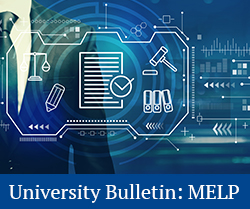
Master of Engineering in Engineering, Law, and Policy
With the increasing rate of technological innovation and convergence among technologies and systems—such as Industry 4.0; energy and communication systems; the digitalization of industry through automation, machine learning, and artificial intelligence, among others—unprecedented political, ethical, economical, legal, and social implications emerge. These result in new opportunities as well as risks. To prepare the next generation of STEM professionals versed in policy and law systems and in the way emerging technologies interact with and enter into these systems, the Law, Policy, and Engineering (LPE) initiative created a new master of engineering degree in engineering, law, and policy (MELP).
The engineering, law, and policy degree leverages strengths from across Penn State as the first graduate program of its kind. This innovative non-thesis residential master’s program is the first academic offering of LPE, a collaborative initiative between the College of Engineering, the School of International Affairs, and Penn State Law at University Park. Students that pursue the MELP degree will attain broad interdisciplinary competence, an understanding of the societal and ethical impacts of emerging technologies, and technical, policy, and regulatory skills to become innovative leaders of change. This advanced professional program is flexible and can be customized to meet each students’ interests, needs, and technical background. It can be completed in as little as two semesters of intensive study, one year of full-time study, or two years of part-time study.
Application Deadlines
| Fall Admission Deadlines | Spring Admission Deadlines |
|---|---|
| July 10 same year for domestic students | December 10 prior year for domestic students |
| April 10 same year for international students | September 10 prior year for international students |
| Exceptions to these dates may be considered with proper justification, or for summer entry. Early application for admission is recommended — two months prior to deadline. | |
Objectives, Skills, and Outcomes
Objectives
The M.Eng. in engineering, law, and policy will prepare students and professionals from diverse engineering majors and technical backgrounds to address societal change and the rapid progress of technology and globalization and become innovative leaders of change. MELP students will be versed in science and technology policy, legal and regulatory policy, complex systems design, and anticipating technology trends. They will acquire strong technical and analytical skills in systems thinking and an understanding of the convergence between engineering, law, and policy for the successful development and implementation of technology-based strategies and solutions.
The professional MELP degree was designed to integrate three main subject areas and an interdisciplinary core necessary to address complex societal problems: a technical depth in systems thinking and systems design, a fundamental understanding of legal and regulatory frameworks, and domestic and global policy. Its interdisciplinary core fosters academic and research engagement of MELP students with law and policy students through experiential learning and public interest technology.
Skills
Through this program, students will acquire the skills to:
- Develop solutions to complex societal problems by applying systems thinking and principles of engineering system and integrating perspectives from law, policy, engineering, and ethics;
- Recognize, analyze and explain the fundamental principles of advanced topics in technology, technology policy, and law;
- Connect local, national, and global problems, resources, and solutions;
- Use language and concepts in ways that are consistent with how the law works, explain legal reasoning and analysis, critically read and analyze legal information, and identify and avoid the unauthorized practice of law;
- Identify, interpret and explain interdisciplinary and trans-disciplinary perspectives and find common ground among them on which to build solutions;
- Distinguish, analyze and model engineering systems, legal systems, and policymaking systems; communicate the interplay between such systems in regard to emerging technologies and their integration into existing systems;
- Perform productively on an interdisciplinary team where members together provide leadership and create a collaborative and inclusive environment;
- Communicate effectively across disciplines with a range of audiences and stakeholders.
The MELP program provides students the opportunity to choose a technical focus area to deepen their knowledge at the intersection of law, policy, and engineering, including environmental, nuclear energy policy and nuclear security, computer and network security, autonomous vehicles, energy, telecommunications, biological and agricultural, nanotechnology and additive manufacturing, and biomedicine and health care technologies, among others.
Outcomes
MELP graduates will acquire the tools to communicate science, technology, and emerging trends effectively to policymakers, regulators, and decision-makers to inform public policy; and also inform research development and innovation based on existing ethical, policy, and regulatory frameworks.
The program is designed to develop the attributes required by today’s successful engineering and tech executives, analysts, consultants, strategists, project managers, research scientists, advocates, policymakers, developers, entrepreneurs, and advisers to succeed in industry, government, non-governmental organizations, and nonprofits. Specifically, these include increased technical, policy, and regulatory skills; expanded professional skills; the ability to identify opportunities for change, innovate, and implement improvements; and the ability to work and communicate effectively in a globally connected and interdisciplinary work environment.
The MELP program will enhance an engineer's key features: solidly grounded, technically broad, globally and civic-minded, ethical, innovative, excellent collaborators, and visionary leaders with an understanding of science and technology policy that excel at delivering impact with social consciousness.

- Contact
- M.Eng. Engineering, Law, and Policy
213 Hammond Building
University Park, PA 16802
lpe@engr.psu.edu


